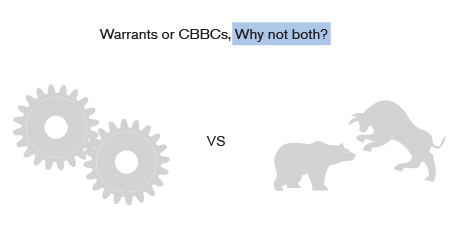Guide for Beginners

-
Similarities and differences
Now you've learned the basics about a warrant and a CBBC, you can compare the features of these two products:
Warrants CBBCs Gearing Structured products with gearing Underlying asset Choices are many,
including indices, stocks, commodities and foreign currenciesChoices are limited
to indices and approximately 30 stocksTenor Both have an expiry date and are settled upon expiry Mandatory call feature None Trading stops immediately when spot price reaches call price Implied volatility Price is affected Price is not affected Time decay Deducted on a daily basis Known as funding cost, with daily deduction less than that for a warrant On the whole, warrants have more choices on underlying assets and no call feature; but they are affected by implied volatility and subject to daily deduction of time decay. CBBCs have less choice on underlying assets and a call feature; but their prices are not affected by implied volatility and they are only subject to a small funding cost deduction.
-
Make choices according to market conditions
Investors considering derivatives are often faced with the choice between a warrant and a CBBC. In fact, it is hard to pass on an absolute judgment as the two products have their own pros and cons. Investors should utilize both instruments flexibly in accordance with market conditions.
In a volatile market, most investors tend to use warrants since CBBCs have a higher risk of being called back. Additionally, the implied volatility of a warrant is likely to increase when the volatility of the underlying asset increases, from which, therefore, the warrant price will benefit.
While in a ranging market, most investors turn to CBBCs as the risk of being called back is lower, whereas the implied volatility of a warrant puts the warrant at risk of “warrant shrinkage”.
In addition, if investors intend to make medium- and long-term investments, CBBCs are more frequently used for this purpose because, unlike warrants which have daily time decay, CBBCs are unaffected by this factor, with only a small amount of funding cost deducted during its tenor. To avoid increasing the risk of a call event brought about by short-term volatility, some investors may pick CBBCs with medium to further call levels for medium- and long-term investments, so as to track the underlying asset price trend for a period of time.
| Warrants | CBBCs | |
|---|---|---|
| Gearing | Yes |
|
| Call feature | No | Yes |
| Time decay | Yes | No |
| Implied volatility | Affected | Unaffected |

